新概念2 Lesson 22 A glass envelope知识清单
新概念英语第二册Lesson22(共22页)精编版
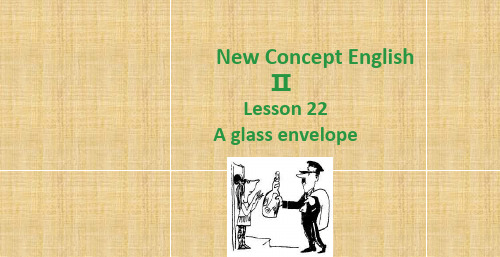
across 用法
• 1. 无论用作介词还是用作副词,均可表示动态意义或静态意义: • (1) 表示动态意义,意为“横过”“到…的另一边”。如: • Can you swim across? 你能游过去吗? (副词用法) • I cam swim across the river in 10 minutes. 我可以在10分钟之内游过河去。(介词用法) • (2) 表示静态意义,意为“在…的另一边”。如: • My house is just across the street. 我家就在街道对面。(介词用法) • We leave Dover at ten and we should be across in France by midnight. 我们10点钟离开多
3.She threw the bottle into the sea. She never
thought of it again, but ten months later, she received
a letter from a girl in Holland.
• think of指“考虑”、“想”、“想起”等:
• Do you ever think of the girls you met at a party? • 你会想起你在一个晚会上遇到的姑娘们吗? • never 从不 • often = frequently [5fri:kwEntlI] • occasionally [E5keIVEnElI] (偶尔) • = sometimes(有时) • = now and again (时而, 不时)
佛,午夜时应能抵达法国那travelling across the Channel and Jane put a piece of paper with her name and address on it into a bottle.
新二22课笔记
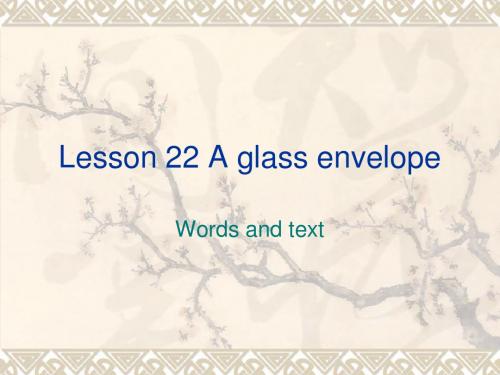
Both
girls write to each other regularly now. However, they have decided to use the post office. Letters will cost a little more, but they will certainly travel faster. 10. write to sb 给某人写信 11. each other 彼此、互相 12. regularly adv. 有规律地 13. decide to do 决定做某事
1. _________梦想某事、做某事 2. _________ = _________收到某人的来信 3. _________与某人同龄 4. _________去年 5. _________横渡英吉利海峡 6. _________一张纸 7. _________把…放进…里 8. _________把…扔进…里 9. _________考虑、想 10. _________给某人写信 11. _________彼此、互相 12. _________ adv. 有规律地 13. _________决定做某事
My daughter, Jane, never dreamed of receiving a letter from a girl of her own age in Holland. Last year, we were travelling across the Channel and Jane put a piece of paper with her name and address on it into a bottle. Answer: The stranger answered message Jane had sent in a bottle ten months before. 1.dream of sth/doing sth 梦想某事、做某事 2.receive a letter from sb = hear from sb 收到某人的来信 3.of one’s own age 与某人同龄 st year 去年 5. travel across the Channel 横渡英吉利海峡 6. a piece of paper 一张纸 7.put sth into a place 把…放进…里
新概念英语第二册第22课
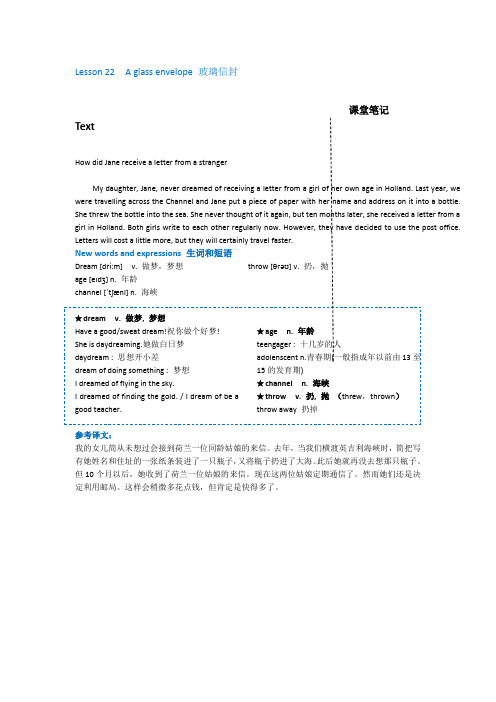
Lesson 22 A glass envelope 玻璃信封参考译文:我的女儿简从未想过会接到荷兰一位同龄姑娘的来信。
去年,当我们横渡英吉利海峡时,简把写有她姓名和住址的一张纸条装进了一只瓶子,又将瓶子扔进了大海。
此后她就再没去想那只瓶子。
但10个月以后,她收到了荷兰一位姑娘的来信。
现在这两位姑娘定期通信了。
然而她们还是决定利用邮局。
这样会稍微多花点钱,但肯定是快得多了。
TestMy daughter, Jane, never dreamed of receiving a letter from a girl of her own age in Holland.Last year, we were travelling across the Channel and Jane put a piece of paper with her name and address on it into a bottle.She threw the bottle into the sea.She never thought of it again, but ten months later, she received a letter from a girl in Holland.Both girls write to each other regularly now.However, they have decided to use the post office.Letters will cost a little more, but they will certainly travel faster.参考译文我的女儿简从未想过会接到荷兰一位同龄姑娘的来信。
去年,当我们横渡英吉利海峡时,简把写有她姓名和住址的一张纸条装进了一只瓶子。
她将瓶子扔进了大海。
此后她就再没去想那只瓶子,但10个月以后,她收到了荷兰一位姑娘的来信。
Lesson22Aglassenvelope(新概念第二册笔记)
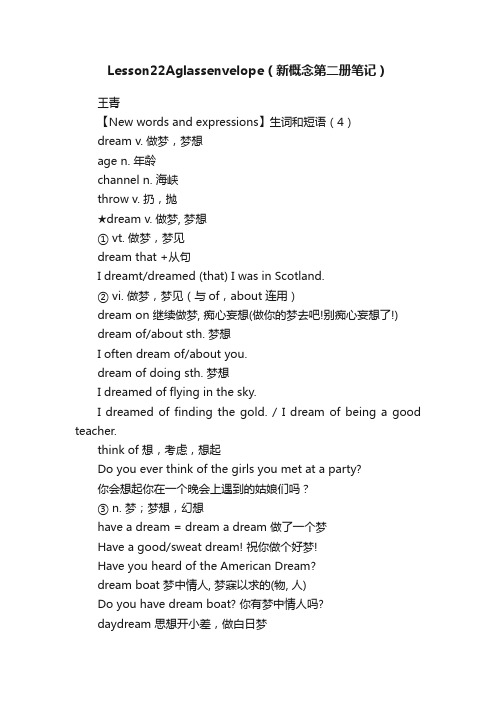
Lesson22Aglassenvelope(新概念第二册笔记)王青【New words and expressions】生词和短语(4)dream v. 做梦,梦想age n. 年龄channel n. 海峡throw v. 扔,抛★dream v. 做梦, 梦想① vt. 做梦,梦见dream that +从句I dreamt/dreamed (that) I was in Scotland.② vi. 做梦,梦见(与of,about连用)dream on 继续做梦, 痴心妄想(做你的梦去吧!别痴心妄想了!)dream of/about sth. 梦想I often dream of/about you.dream of doing sth. 梦想I dreamed of flying in the sky.I dreamed of finding the gold. / I dream of being a good teacher.think of 想,考虑,想起Do you ever think of the girls you met at a party?你会想起你在一个晚会上遇到的姑娘们吗?③ n. 梦;梦想,幻想have a dream = dream a dream 做了一个梦Have a good/sweat dream! 祝你做个好梦!Have you heard of the American Dream?dream boat 梦中情人, 梦寐以求的(物, 人)Do you have dream boat? 你有梦中情人吗?daydream 思想开小差,做白日梦She is daydreaming.★age n. 年龄teengager n. 十几岁的人adolenscent n. 青春期(一般指成年以前由13至15 的发育期)★throw(threw,thrown) v. 扔, 抛① vt. 投,扔,抛Don’t throw stones at the dog.Throw the ball to T om.throw away 扔掉Shall I throw this old newspaper away?116新概念英语第二册笔记② 把……对准目标,向……作出举动George was very happy today. Julie had thrown a smile at him in the morning.The boss threw him an angry look.【Text】My daughter, Jane, never dreamed of receiving a letter from a girl of her own age in Holland. Last year, wewere travelling across the Channel and Jane put a piece of paper with her name and address on it into a bottle. She threw the bottle into the sea. She never thought of it again, but ten months later, she received a letter from a girl in Holland. Both girls write to each other regularly now. However, they have decided to use the post office. Letters will cost a little more, but they will certainly travel faster.参考译文我的女儿简从未想过会接到荷兰一位同龄姑娘的来信. 去年, 当我们横渡英吉利海峡时, 简把写有她姓名和住址的一张纸条装进了一只瓶子, 又将瓶子扔进了大海. 此后她就再没去想那只瓶子. 但10 个月以后, 她收到了荷兰一位姑娘的来信. 现在这两位姑娘定期通信了. 然而她们还是决定利用邮局. 这样会稍微多花点钱, 但肯定是快得多了.【课文讲解】1、My daughter, Jane, never dreamed of receiving a letter from a girl of her own age in Holland.同位语 My daughter,Janedream of doing sth. 梦想,幻想………of one's own age 同年龄的……He is boy of my own age.receive…from… 从……收到……2、Last year, we were travelling across the Channel and Jane put a piece of paper with her name and addresson it into a bottle.the Channel= the English Channel 英吉利海峡with 可放在句子后面做状语用,也可放在名词后面做定语。
A glass envelope玻璃信封-新概念英语第二册自学导读笔记第22课
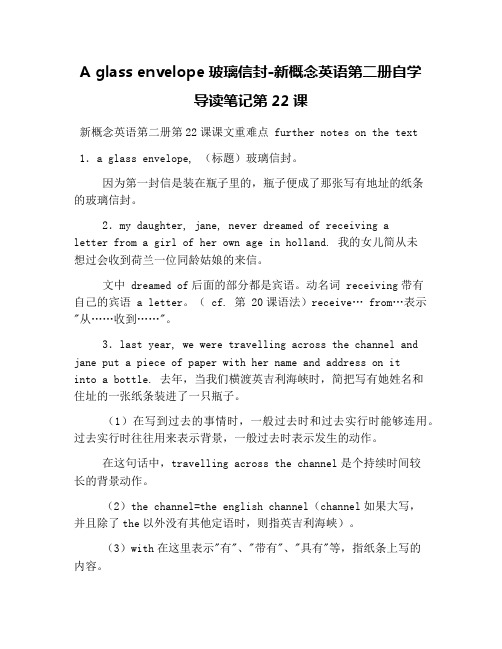
A glass envelope玻璃信封-新概念英语第二册自学导读笔记第22课新概念英语第二册第22课课文重难点 further notes on the text1.a glass envelope, (标题)玻璃信封。
因为第一封信是装在瓶子里的,瓶子便成了那张写有地址的纸条的玻璃信封。
2.my daughter, jane, never dreamed of receiving aletter from a girl of her own age in holland. 我的女儿简从未想过会收到荷兰一位同龄姑娘的来信。
文中 dreamed of后面的部分都是宾语。
动名词 receiving带有自己的宾语 a letter。
( cf. 第 20课语法)receive… from…表示"从……收到……"。
3.last year, we were travelling across the channel and jane put a piece of paper with her name and address on itinto a bottle. 去年,当我们横渡英吉利海峡时,简把写有她姓名和住址的一张纸条装进了一只瓶子。
(1)在写到过去的事情时,一般过去时和过去实行时能够连用。
过去实行时往往用来表示背景,一般过去时表示发生的动作。
在这句话中,travelling across the channel是个持续时间较长的背景动作。
(2)the channel=the english channel(channel如果大写,并且除了the以外没有其他定语时,则指英吉利海峡)。
(3)with在这里表示"有"、"带有"、"具有"等,指纸条上写的内容。
4.she never thought of it again…此后她就再没去想那只瓶子……think of指"考虑"、"想"、"想起"等:do you ever think of the girls you met at a party?你会想起你在一个晚会上遇到的姑娘们吗?5.both girls write to each other regularly now. 现在这两位姑娘定期通信了。
(最新版)新概念第二册Lesson-22--A-glass-envelope

language points
but ten months later, she received a letter… 时间段 + later (用于过去时) 与 in + 时间段 (用于将来时)
e.g He went to London a week ago. Three days later
① vt. 投,扔,抛
e.g. Don’t throw stones at the dog.
e.g. Throw the ball to Tom. • throw away 扔掉 e.g. Shall I throw this old newspaper away? ② 把……对准目标,向……作出举动 • The boss threw him an angry look. ◆ throw up
3. ---Would you like to have tea or coffee?
---Either ________(be) OK. is
4. All the students ________(have) gone to the playground. have has 5. All the meat _________(have) been eaten up. 6. Neither of the girls ___________(want) to take part in the wants high jump.
都
两者 三者(以上) 谓语
都不
任何
either both all neither none any
单数
复数(all指不 单数(none 可数时 也可用复数) 应用单数)
用正确的动词填空
like 1. Both of them ________(like) sports. is/are 2. None of the people _________(be) in the room.
新概念2 Lesson 22 A glass envelope知识清单
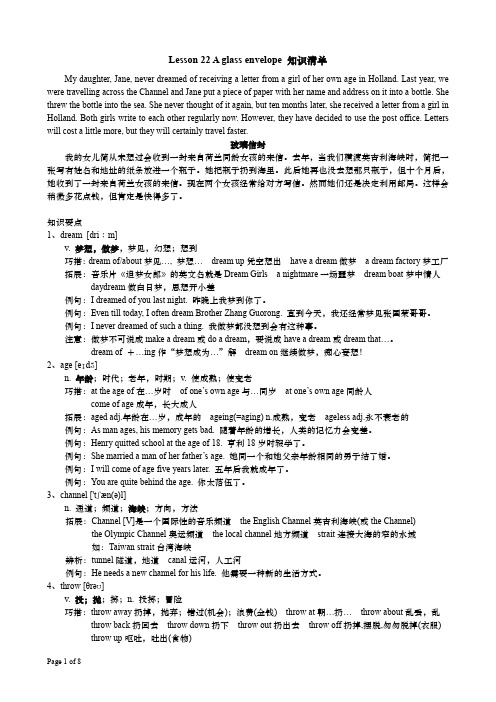
Lesson 22 A glass envelope 知识清单My daughter, Jane, never dreamed of receiving a letter from a girl of her own age in Holland. Last year, we were travelling across the Channel and Jane put a piece of paper with her name and address on it into a bottle. She threw the bottle into the sea. She never thought of it again, but ten months later, she received a letter from a girl in Holland. Both girls write to each other regularly now. However, they have decided to use the post office. Letters will cost a little more, but they will certainly travel faster.玻璃信封我的女儿简从未想过会收到一封来自荷兰同龄女孩的来信。
去年,当我们横渡英吉利海峡时,简把一张写有姓名和地址的纸条放进一个瓶子。
她把瓶子扔到海里。
此后她再也没去想那只瓶子,但十个月后,她收到了一封来自荷兰女孩的来信。
现在两个女孩经常给对方写信。
然而她们还是决定利用邮局。
这样会稍微多花点钱,但肯定是快得多了。
知识要点1、dream [driːm]v. 梦想,做梦,梦见,幻想;想到巧搭:dream of/about梦见…, 梦想… dream up凭空想出have a dream做梦 a dream factory梦工厂拓展:音乐片《追梦女郎》的英文名就是Dream Girls a nightmare一场噩梦dream boat梦中情人daydream做白日梦,思想开小差例句:I dreamed of you last night. 昨晚上我梦到你了。
新概念英语2 Lesson 22 A glass envelope

write(or about) 写……的事
2023/3/7
莘阳希望每一位学子学业进步,理想成真!
The past
2021年
2022 年
The present
The future
2023 年
throw back扔回来
throw away扔掉
2023/3/7
课文讲解
A glass envelope玻璃信封
陌生人
How did Jane receive a letter from a stranger? 想到会收到一封信
My daughter, Jane, never dreamed of receiving a letter from a girl of her own age in Holland. 荷兰
单词讲解
channel 【知识拓展】
n. 海峡;频道;道;通道 Discovery Channel探索频道,纪录片
Disney Channel 迪士尼频道
marketing channel销售渠道,行销通道
throw 【知识拓展】
v. 扔,抛,投
v. 把……对准目标;向……做出举动
throw--threw—thrown
I have never heard of the actress.
2023/3/7
重点语法
后面可跟of, from, in和on的动词 许多动词后面加上介词后仍具有其通常意义,但它们与哪些介词连用却往往是固定的,如borrow from, believe in(相信,信仰),receive from等。 还有些动词可与不同的介词连用,动词的意义改变并不大,如dream of/ about, help in/ with, expect of/ from等。 在学习中,要牢记哪些介词与它们连用。如下动词和介词通常可以分开使用,可以有自己的宾语,并且大部分都 可用于被动结构。 (2)from连用的动词
- 1、下载文档前请自行甄别文档内容的完整性,平台不提供额外的编辑、内容补充、找答案等附加服务。
- 2、"仅部分预览"的文档,不可在线预览部分如存在完整性等问题,可反馈申请退款(可完整预览的文档不适用该条件!)。
- 3、如文档侵犯您的权益,请联系客服反馈,我们会尽快为您处理(人工客服工作时间:9:00-18:30)。
Lesson 22 A glass envelope 知识清单My daughter, Jane, never dreamed of receiving a letter from a girl of her own age in Holland. Last year, we were travelling across the Channel and Jane put a piece of paper with her name and address on it into a bottle. She threw the bottle into the sea. She never thought of it again, but ten months later, she received a letter from a girl in Holland. Both girls write to each other regularly now. However, they have decided to use the post office. Letters will cost a little more, but they will certainly travel faster.玻璃信封我的女儿简从未想过会收到一封来自荷兰同龄女孩的来信。
去年,当我们横渡英吉利海峡时,简把一张写有姓名和地址的纸条放进一个瓶子。
她把瓶子扔到海里。
此后她再也没去想那只瓶子,但十个月后,她收到了一封来自荷兰女孩的来信。
现在两个女孩经常给对方写信。
然而她们还是决定利用邮局。
这样会稍微多花点钱,但肯定是快得多了。
知识要点1、dream [driːm]v. 梦想,做梦,梦见,幻想;想到巧搭:dream of/about梦见…, 梦想… dream up凭空想出have a dream做梦 a dream factory梦工厂拓展:音乐片《追梦女郎》的英文名就是Dream Girls a nightmare一场噩梦dream boat梦中情人daydream做白日梦,思想开小差例句:I dreamed of you last night. 昨晚上我梦到你了。
例句:Even till today, I often dream Brother Zhang Guorong. 直到今天,我还经常梦见张国荣哥哥。
例句:I never dreamed of such a thing. 我做梦都没想到会有这种事。
注意:做梦不可说成make a dream或do a dream,要说成have a dream或dream that…。
dream of+…ing作“梦想成为…”解dream on继续做梦,痴心妄想!2、age [eɪdʒ]n. 年龄;时代;老年,时期;v. 使成熟;使变老巧搭:at the age of在…岁时of one’s own age与…同岁at one’s own age同龄人come of age成年,长大成人拓展:aged adj.年龄在…岁,成年的ageing(=aging) n.成熟,变老ageless adj.永不衰老的例句:As man ages, his memory gets bad. 随着年龄的增长,人类的记忆力会变差。
例句:Henry quitted school at the age of 18. 亨利18岁时辍学了。
例句:She married a man of her father’s age. 她同一个和她父亲年龄相同的男子结了婚。
例句:I will come of age five years later. 五年后我就成年了。
例句:You are quite behind the age. 你太落伍了。
3、channel ['tʃæn(ə)l]n. 通道;频道;海峡;方向,方法拓展:Channel [V]是一个国际性的音乐频道the English Channel英吉利海峡(或the Channel) the Olympic Channel奥运频道the local channel地方频道strait连接大海的窄的水域如:Taiwan strait台湾海峡辨析:tunnel隧道,地道canal运河,人工河例句:He needs a new channel for his life. 他需要一种新的生活方式。
4、throw [θrəʊ]v. 投;抛;掷;n. 投掷;冒险巧搭:throw away扔掉,抛弃;错过(机会);浪费(金钱) throw at朝…扔… throw about乱丢,乱throw back扔回去throw down扔下throw out扔出去throw off扔掉,摆脱,匆匆脱掉(衣服)throw up呕吐,吐出(食物)词组:throw sb.(sth.) into…把某人(某物)扔进… throw sb.(sth.) away抛弃某人(某物)例句:Stop throwing stones at the cars. 别再向汽车扔石头了。
例句:She threw the bottle into the sea. 她将瓶子扔进了大海。
5、decide [dɪ'saɪd]v. 决定巧搭:decide against决心不,决定反对decide between抉择decide for sth.决定做某事用法:指经过询问、研究、思考后,在几种可能性中作大体上的选择。
例句:Have you decided where you’ll? 你已决定度假的地点了吗?6、cost [kɒst]vt. 花费;n. 费用,代价,成本巧搭:at all costs不惜任何代价at the cost of以…为代价at cost照原价,照成本例句:The new production process will cut costs to consumers. 新的生产工序将减少消费者的花费。
7、本课语法:介词的固定搭配用法与介词搭配的有动词、名词和形容词一、动词与介词搭配①动词+介词,此类结构相当于及物动词,可用被动语句。
例句:The hunter aimed at the lion and fired, but missed. 猎人对准狮子开了枪,但是没打中。
②动词+名词+介词,此类只作及物动词,短语中的名词名词前可以有形容词修饰,做定语。
例句:Please pay attention to what the teacher says. 请注意老师说的话。
③动词+副词+介词,此类只作及物动词。
例句:The money their son spent in French added up to 5,000 dollars. 他们的儿子在法国花了5000美元。
二、形容词与介词搭配①与to连用favorable, familiar, good, useful, similar, used等②与about连用careful, happy, mad, sure, sad等③与for连用bad, good, famous, hungry, necessary, ready, sorry等④与with连用angry, careful, ill, popular, strict, busy, familiar等⑤与of连用,多用于表情感,恐惧、好恶、态度、意识等afraid, scared, terrified, proud, tired, ignorant, aware, full, hopeful⑥与at连用angry, bad, clever, disappointed, good, useless等【注意】有些形容词可以搭配不同的介词,具备不同的意思。
使用时因注意区别。
三、与名词搭配的短语①名词+forreason, need等②名词+in, 主要表现在某方面a change in the costs, an increase(或a rise, a decrease, a fall) in the costs, a difference(或similarity) inthis aspect,③名词+toa reaction to my advice(或suggestion, news)④名词+with/betweenA has a relationship/contact/connection with B.a relationship/contact/connection/difference/similarity between A and B.8、glass [glɑːs]n. 玻璃;玻璃制品;镜子;【复数glasses】眼镜用法:“玻璃”不可数;“玻璃杯”可数9、travel ['træv(ə)l]n. 旅行;游历;漫游;【复数travels游记】vt. 经过;在…旅行;vi. 旅行用法:指长距离的长期游历,特别是长途的海外游历。
不可与不定冠词搭配(区别于trip等avelling)。
其现在分词是traveling或travelling10、短语集萃①think of考虑,想,想起例句:I will think of you.例句:He often thinks of the girl he met at the party.②each other彼此,相互。
一般指两者之间。
one another相互,常用于三者之间,有时可互换。
例句:Students should help each other(one another).③go in for参加(比赛);爱好,沉迷于(音乐、跳舞等) 动+副+介结构例句:I don’t go in for sports. 我不喜欢体育运动。
例句:She goes in for stamp collecting. 她爱好集邮。
11、with her name and address on it. 介词结构做后置定语。
英语中较为普遍的用法。
12、介词搭配的大致倾向:of 表示所属、部分、分离from 表示变化、差异、分离in 表示从事、环境、进入on 表示关系、支持、影响13、拓展篇在美国,邮件的表示方法:airmail空邮surface mail平寄mail by sea海邮registered mail挂号certified mail保价return receipt mail回执ordinary mail平寄express mail快件关于邮寄信件的场景对话:A: I’d like to send this letter to Paris.B: By ordinary mail or express mail?A: How fast is it if I use express mail?B: It’ll get there in three or four days.A: Then by express mail, please.同步互动真题集①1. ---Is Peter there?--- , please. I’ll see if I can find him for you.A. Hold upB. Hold onC. Hold outD. Hold off2. After studying in a medical college for five years, Jane her job as a doctor in the countryside.A. set outB. took overC. took upD. set up3. Don’t be so discouraged. If you such feelings, you will do better next time.A. carry onB. get backC. break downD. put away4. He is very popular among his students as he always tries to make them in his lectures.A. interestedB. interestingC. interestD. to interest5. ---I’m very with my own cooking. It looks nice and smells delicious.---Mm, it does have a smell.A. pleasant, pleasedB. pleased, pleasedC. pleasant, pleasantD. pleased, pleasant名师精讲笔记题目1. I don’t rock’n’roll. It’s much too noisy for my taste.A. go afterB. go away withC. go intoD. go in for同步互动真题集②一、用适当介词填空noun.+prep.1. Money isn’t the solution every problem.2. When I opened the envelope, I was delighted to find a check$500.3. There are many advantages being able to speak a foreign language.4. Bill and I used to be good friends but I don’t have much contact him now.5. What was Clint’s reaction the news?6. The fact that Jane was offered a job has no connection the fact that her cousin is the managing director.adj.+prep.7. It was very nice you to do my shopping for me.8. It was a bit careless you to leave the door unlocked when you went out.9. We always have the same food every day. I’m fed up it.10. We enjoyed our holiday, but we were a bit disappointed the hotel.11. I’ve been trying to learn Spanish but I’m not very satisfied my progress.12. Are you angry what happened?13. The people next door are furious us making so much noise last night.14. I’m sorry the smell of paint in this room. I’ve just decorated it.15. The man we interviewed for the job was intelligent but we weren’t very impressed his appearance.16. He said he was sorry the situation but there was nothing he could do.17. These days everybody is aware the dangers of smoking.18. She’s much more successful than I am. Sometimes I feel a bit jealous her.19. I’m not surprised she changed her mind at the last moment. That’s typical her.20. John has no money of his own. He’s totally dependent his parents.21. You look bored. You don’t seem interested what I’m saying.verb.+prep.22. A strange thing happened me a few days ago.23. I don’t believe working very hard. It’s not worth it.24. I hope you succeed getting what you want.25. There was an awful noise as the car crashed a tree.26. Do you spend much money clothes?27. I prefer traveling by train driving. It’s much more pleasant.28. I felt quite cold but Peter insisted having the window open.29. What happened the money I lent you? What did you spend it ?30. I filled the tank but unfortunately I filled it the wrong king of petrol.二、基础练习题1. Richard doesn’t think he could ever take what is called “free-style” poetry.A. onB. overC. toD. after2. I don’t want to lend any more money to him; he’s already in debt me.A. toB. forC. ofD. with3. Although he thought he was helping us prepare the dinner, he was actually the way.A. byB. onC. offD. in4. Stressful environments lead to unhealthy behaviors such as poor eating habits, which increase the risk of heart disease.A. in turnB. in returnC. by chanceD. by turns5. It isn’t so much whether he works hard; the question is whether he works .A. above allB. in allC. at allD. after all6. All the information we have collected in relation to that case very little.A. makes up forB. add up toC. comes up withD. puts up with7. A really powerful speaker can the feeling of the audience to the fever of excitement.A. work outB. work overC. work atD. work up8. When the engine would not start, the mechanic inspected all the parts to find what was at .A. wrongB. troubleC. faultD. difficulty9. When workers are organized in trade unions, employers find it hard to lay them .A. offB. asideC. outD. down10. There are several huge trees the temple.A. in the front ofB. in front ofC. on the front ofD. on front of三、英语介词搭配练习1. pay attention 注意;take notice 留意到2. lend a book me借给我一本书;borrow a book him向他借本书;send a postcard him寄给他明信片;pass/hand a glass of water him递给他一杯水3. receive a letter sb.=hear sb.收到…来信4. pay a visit 拜访某人/某地;pay sth.为…付钱;call 拜访某人;call 拜访某地5. up now=so far到目前为止;present目前四、真题再现1. ---When do we need to pay the balance?--- September 30.A. InB. ByC. DuringD. Within2. After the earthquake, the injured were cared in the local hospitals or taken by air to the hospitals in the neighboring cities.A. ofB. forC. afterD. with3. Sorry, madam. You’d better come tomorrow because it’s the visiting hours.A. duringB. atC. beyondD. before4. People have always been curious how living things on the earth exactly began.A. inB. atC. ofD. about5. ---Can he take charge of the computer company?---I’m afraid it’s his ability.A. beyondB. withinC. ofD. to6. ---What do you want these old boxes?---To put things in when I move to the new flat.A. byB. forC. ofD. with7. Marie Curie took little notice the honours that were given to her in her late years.A. ofB. onC. aboutD. from8. The conference has been held to discuss the effects of tourism the wildlife in the area.A. inB. onC. atD. with9. He suddenly saw Sue the room. He pushed his way the crowd of people to get to her.A. across, acrossB. over, throughC. over, intoD. across, through全新全绎测试篇1. He took my umbrella .A. with mistakeB. by mistakeC. in mistakeD. by fault2. He’s sometimes bad-tempered but he is a good fellow .A. by heartB. with heartC. in heartD. at heart3. The speech was so long and dull that I could hardly put up it.A. toB. uponC. withD. into4. The new TV set is good, some flashes on the screen.A. besidesB. beyondC. except forD. outside of5. Perhaps economy is the solution your financial troubles.A. atB. toC. onD. of6. Science has brought many changes in our lives.A. aroundB. aboutC. forwardD. back7. My sister is really enthusiastic music.A. aboutB. onC. withD. by8. An objective of Women’s Liberation is to do unfair discrimination against women.A. out ofB. away withC. away fromD. up down小题大做词汇测试1. He inherited(继承) a large of money from his uncle.A. someB. somesC. sumD. sums2. The reason his absence is still unclear to us.A. ofB. forC. toD. about3. the age of fourteen, he went to the US with his parents.A. OnB. AtC. InD. Of4. The boy threw a stone the window.A. atB. ofC. toD. with5. ---Could you take care of my dog while I’m away?---Sure, Leave it to me.A. perhapsB. possiblyC. maybeD. probably6. The patient is supposed to go to the hospital for checks.A. commonB. normalC. regularD. usual7. The Internet has brought big changes in the way we work.A. aboutB. outC. backD. up8. ---I’d like to see the movie very much, but I have no money on me.---That’s OK. This is my .A. offerB. treatC. turnD. service9. They’ve us£150,000 for the house. Shall we take it?A. providedB. suppliedC. shownD. offered10. It is believed that if a book is , it will surely the reader..A. interested, interestB. interesting, be interestedC. interested, be interestingD. interesting, interest语法测试1. The Moon many times by men so far.A. has been visitedB. have been visitedC. was visitedD. were visited2. ---Why did you leave that position?---I a better position at IBM.A. offerB. offeredC. am offeredD. was offered3. at the door before entering, please.A. KnockedB. To knockC. KnockingD. Knock4. ---Why does Michael know so much about Angkor watt?---He have been there, or…A. mustB. oughtn’t toC. mayD. can’t5. According to the art dealer, the painting to go for at least a million dollars.A. is expectedB. expectsC. expectedD. is expecting6. You don’t have to drive him home. He already.A. has leftB. is leavingC. had leftD. leaves7. ---Oh, it’s you! I you.---I’ve just had my hair cut, and I’m wearing new glasses.A. didn’t recognizeB. hadn’t recognizedC. haven’t recognizedD. don’t recognized8. My uncle lives 105 Beijing street.A. onB. atC. toD. of9. He slept well all the windows open.A. whenB. whileC. withD. because10. We offered him our congratulations his passing the college entrance exams.A. atB. ofC. forD. on11. If you keep on, you’ll succeed .A. in timeB. at one timeC. at the same timeD. on time12. Great men never give up difficulty.A. in face of theB. when facing withC. in the face ofD. when facing by13. The train leaves at 6:00 p.m. So I have to be at the station 5:40 p.m. at the latest.A. untilB. afterC. byD. around14. ---Can I join your club, Dad?---You can when you a bit older.A. getB. will getC. are gettingD. will have got15. is a fact that English is being accepted as an international language.A. ThereB. ThisC. ThatD. It阅读理解Sarah left school at eighteen, went to college and then worked at a computer company. Four years later, she got a new job as a manager on British Airways(英国航空公司). This is what she told us about her job: “My office is at Heathrow Airport, but I spend 60% of my time in the air. I teach air-hostesses and help them with any problems. I also go to lots of meetings.My hours are usually from 8 a.m. to 4 p.m., but sometimes I work from 1 p.m. to 9 p.m. At work, the first thing I do is check plane times on my computer and then I speak with some of the air-hostesses.Sometimes I go on long flights to check how the air-hostesses are doing. That’s my favorite part of the job, but I like office work, too. Traveling can be hard work. When I get back from a long trip, all I can do is eat something and then go to bed! I don’t make much money, but I’m happy with British Airways and want to stay there and continue to travel.”1. Sarah’s first job was .A. at a collegeB. at a computer companyC. in British AirwaysD. at Heathrow Airport2. Sarah does most of her work .A. in meetingsB. in the computer roomC. in the officeD. in airplanes3. Most days Sarah starts work at .A. 8 a.m.B. 1 p.m.C. 4 p.m.D. 9 p.m.4. The first thing Sarah does after a long trip is .A. go to bedB. have a mealC. go to a meetingD. go to the office5. Sarah would like to .A. make more moneyB. stop travelingC. go to college againD. stay in the same job翻译1. 我迫不及待地要知道考试结果。
